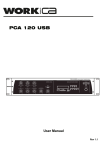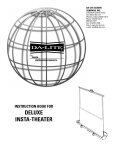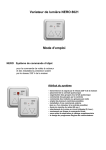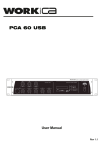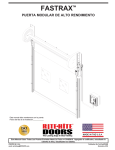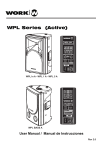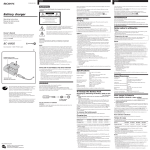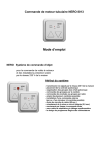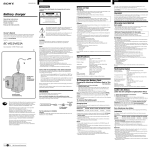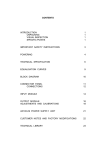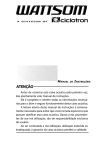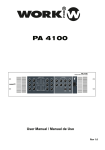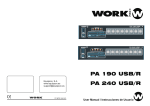Download PA 120/2 - Digital
Transcript
R
PA 120/2
User Manual / Manual de Usuario
Rev. 13.05.01
EN
SAFETY RELATED SYMBOLS
WARNING:
TO REDUCE THE RISK OF FIRE OR
ELECTRIC SHOCK, DO NOT EXPOSE
TO RAIN OR HUMIDITY. DO NOT
REMOVE COVER. THIS PRODUCT IS
NOT INTENDED FOR USE OTHER THAN
STATED.
GRAPHICAL SYMBOLS EXPLANATION
This symbol, wherever used,alerts you to
the presence of un-isulated and dangerous
voltages within the product enclosure.
These are voltages that may be sufficient to
constitute the risk of electric shock.
External Connection
Always use proper ready-made insulated mains
cabling (power cord). Failure to do so could result
in shock or fire. If in doubt, seek advice from a
registered electrician.
Do not Remove Any Cover
This symbol, wherever used, alerts you to
important operating and maintenance
instructions. Please read.
Protective Ground Terminal
AC mains (Alternating Current)
Within the product are areas where high voltages
may be present. To reduce the risk of electric shock
do not remove any covers unless the AC mains
power cord is removed.
Covers should be removed by qualified service
personnel only.
No user serviciable parts inside.
Hazardous Live Terminal
ON: Denotes the product is turned on.
Fuse
OFF: Denotes the product is turned off.
WARNING
Describes precautions that should be observed to
prevent the possibility of death or injury to the user.
CAUTION
To prevent fire an damage to the product, use only
the recommended fuse type as indicated in this
manual. Do not short-circuit the fuse holder.
Before replacing fuse, make sure that the product
is OFF and disconnected from the AC outlet.
Protective Ground
Describes precautions that should be observed to
prevent damage to the product.
WARNING
Before turning the product ON, make sure that it is
connected to Ground. This is to prevent the risk of
electric shock.
Power Supply
Never cut internal or external Ground wires. Likewise,
never remove Ground wiring from the Protective
Ground Terminal.
Ensure that the mains source voltage (AC outlet)
matches the voltage rating of the product. Failure
to do so could result in damage to the product and
possibly the user.
Operating Conditions
Unplug the product before electrical storms occur
and when unused for long periods of time to reduce
the risk of electric shock or fire.
-1-
Always install in accordance with the manufacturer´s
instructions.
To avoid the risk of electrtic shock and damage, do
not subject the product to any liquid/rain or moisture.
Do not use this product when in close proximity to
water.
Do not install this product near any direct heat source.
Do not block areas of ventilation.
User Manual / Manual de Usuario
PA 120/2
EN
FRONT PANEL
11
R
12
1
1.
2.
3.
4.
5.
6.
3
2
4
Mic 1 Volume Control
Mic 2 Volume Control
Input 3 Volume Control
Input 4 Volume Control
Line Volume Control
Aux/CD Switch
7.
8.
9.
10.
11.
12.
9
8
7
6
5
10
Master Tone Control (Bass)
Master Tone Control (Treble)
Master Volume Control
Power On / Off switch
Output level indicator LED
Power On / Off Indicator LED
REAR PANEL
31
32
33
35
34
37 38
39
40
41
42
36
29
30
50 Hz
8A
360 W
FUSE
14
15
16
17
18
19
14. Earth Connection Screw
20
21
29.
30.
31.
32.
15. DC power supply terminals
16. Loudspeaker output terminals
17. Power amp input (RCA)
18. Tape output (2 x RCA)
19. CD input (2 x RCA)
20. Aux input (2 x RCA)
21. Input 4 (COMBI(XLR3P-Jack)/balanced)
22. Mic 4 input (DIN 5P/balanced)
23. Input 3 (COMBI(XLR3P-Jack)/balanced)
24. Mic 3 input (DIN 5P/balanced)
25. Mic 2 input (XLR3P/balanced)
26. Mic 2 Sensitivity control
22
23
24
25
26
27
28
Mic 1 Sensitivity control
Mic 1 input (DIN 5P/balanced)
AC fuse holder
Mains voltage (115/230V) selector switch
33. Mains input socket
34. Pre output (RCA)
35. Mic 4 (Line/Phantom/Mic) selector switch
36. Chime on/off switch
37. Mic 3 (Line/Phantom/Mic) selector switch
38. Monitor output level control
39. Monitor output terminals
40. Priority switch terminals
41. TEL/EMER input terminals
42. TEL/EMER input level control
27. Mic 2 input (DIN 5P/balanced)
28. Mic 1 input (XLR3P/balanced)
-2-
User Manual / Manual de Usuario
PA 120/2
EN
INSTALLATION NOTES
At all times, the amplifier has to be operated under appropriate conditions. This includes that the
operation location provides sufficient ventilation and the device is not exposed to direct sunlight or
direct radiation or reflection from any heat source. Installing the loudspeaker systems choose a location
that is not affected by extreme and / or constant vibration or other mechanical oscillation. Also make
sure that the speakers are installed at locations that are free from dust and / or moisture.
CAUTION
Do not take the risk of electro-shock or shock hazard. To reduce the risk of electro-shock, all connections
have to be accomplished before it is permissible to connect the amplifier to the main supply, Before connecting
the appliance to the mains supply, once again make certain that all connections are carried out correctly and
that no short-circuits exist. The overall sound reinforcement installation has to be in accordance to the
laws, regulations, standards, and guidelines that are relevant and applicable in the country where the
equipment is going to be operated.
AC POWER SUPPLY CAUTION
Before using the amplifier for the first time, make sure that the appliance's voltage is in accordance to
your mains supply. Connect the amplifier only to grounded mains outlets. Connecting the amplifler to
the mains supply(115/230Vac) has to be accomplished by inserting the supplied mains cord into the
corresponding socket and afterward plugging it into a mains outlet.
-3-
User Manual / Manual de Usuario
PA 120/2
EN
CONNECTIONS
Mains Connection (33)
The supply transformer has been designed for use on either 115V AC or 230 V AC, selected by slide
switch on the rear panel (32). The amplifier is factory set at 230 V AC mains voltage.
Battery Connection (24V DC) (15)
When using externaI batteries, the amplifier must be earthed via the screw terminal due to the high
voltages present. This is necessary to ensure the case is earthed and ensure electrical stability.
Input Connections
Mics 1~2 incorporates balanced standard XLR 3P and DIN 5P sockets on the rear panel.
Inputs 3~4 incorporate balanced standard COMBI socket (1/4” stereo jack, and XLR 3P) and DIN 5P on the
rear panel. With the input selector (35 & 37), it is possible to choose the input device (MIC or LINE level ans to
feed a condenser microphone with 24 V phantom power).
Wiring is as follows:
2
1
3
Base sockets
(Front view)
3
1
5
2
4
SLEEVE RING TIP
XLR 3P
DIN 5P
1/4” STEREO JACK
Pin1 : Screen
Pin2 : Signal (live)
Pin3 : Signal (return)
Pin1 : Signal (live)
Pln2 : GND
Pin3 : Signal (Return)
Pin4 : Priority Control
Pin5 : GND
Tip : Signal (live)
Ring : Signal (Return)
Sleeve : Screen
Turn the front panel potentiometers clockwise to increase the volume or anticlockwise to reduce the volume.
NOTE: Mic 1 & Mic 2 are provided with a “Sens VR” (26) & (29) sensitivity potentiometer for gain adjustment.
NOTE: Mic 1 & 2 incorporate phantom power which is ON by default. If you need to disable the phantom power,
look for the S 401 and S402 jumpers on the main PCB. The default position is ON, therefore, change the
jumper to the OFF position.
NOTE: Mic 3 & 4 phantom power can be turned on/off using the rear panel switch (35), (37).
Priority Microphones
PA 120/2 has a cascade priority system, i.e., Mic 1 has the highest priority (apart from TEL/EMER), Mic 2
has priority over the rest of inputs except Mic 1, Mic 3 has priority over the rest of inputs except Mic 1 & Mic 2,
and, finally, Mic 4.
To enable priority short pins 2 & 4 on the DIN 5P connector of the chosen input.
3
1
5
2
- The priority state only remains active whilst the switch is closed.
4
- If the Chime switch (36) is set to on, a ‘Ding Dong’ pre-annoucement chime
will be played; after which an annoncement can be made.
- Priority terminals (40) have the same purpose BUT ONLY
APPLIED TO MIC 1.
Chime On/Off
Switching on the manual chime on/off (36) switch on the rear panel and on priority conditions of any Mic
input, it will activate the chime function ( ‘Ding Dong’ ) pre-annoucement chime).
The default volume of the chime is pre-set at the factory and should be suitable most applications.
-4-
User Manual / Manual de Usuario
PA 120/2
EN
Aux Connection
The PA 120/2 provides an auxiliary input (19) & (20) which may be used for connecting other signal sources
such as a Radio Tuner, CD or Cassette player (LINE level). Select the type of the input (CD or AUX) from the
front panel switch (6), and connect the audio source in the adequeate rear connectors (19) or (20).
Turn the front potentiometer (5) clockwise to increase the volume or anticlockwise to reduce the volume.
The Aux / CD input sockets are standard RCA phono, two sockets are supplied and these are linked together
internally in parallel, this allows a stereo signal source to be used without the need to obtain a special lead,
however you may wish to check with the manufacturer of the signal source to ensure that no damage will result
if the left and right output channels are connected together in parallel.
RCA Phono plug connections
Sleeve - Screen
Pin - Signal
SLEEVE
PIN
Tape Output Connection (18)
These standard RCA phono sockets provide a mixed output suitable for connection to a recorder such as
cassette, MP3 or computer.
Power In & Pre Out (17)
These sockets connect the mixer/preamplifier stage to the power amplifier stage. The connecting link must be
plugged in for normal operation as a mixer/amplifier. If a compressor/limiter, equalizer, or other external signal
processor is used in the sound system, connect the “PRE OUT” to the input of the external processor
and the output of the processor to “POWER IN” in the signal chain, “PRE OUT” is after the tone controls
and the master volume control.
Loudspeaker Connection
This device provides two different types of loudspeaker outputs :
High impedance (100V line) and low impedance (8Ω). You can only use one of these outputs at any one
time; any attempt to use two or more of these may result in damage to the amplifier.
Loudspeaker Outputs
The PA 120/2 provides two different outputs for different purposes:
NORMAL MUSIC/SPEECH (15): This output, with 100V line and 8Ω low impedance connections, gives an
output at all times, reproducing any input signal into the amplifier (Inputs 1-4, AUX). Chime
and priority conditions affect this output.
PRIOR. ONLY (16): This output with 100V line connection, ONLY reproduces a signal during priority
conditions, therefore, the output from this connection will only be present when one or more microphones is/are
in priority conditions. The chime function also affects this output.
8A
-5-
User Manual / Manual de Usuario
PA 120/2
EN
Example loudspeaker output connections (15) & (16)
8A
8A
+
0
100V
0
100V
0
100V
8 ohm
Connecting a single speaker to 8 ohm output
Connecting multiple speakers in parallel to the 100V PRORITY ONLY output
Output terminals for auxiliary loudspeaker (39)
These terminals allow the connection of a small external loudspeaker that gets driven by an internal auxiliary
power amplifier, providing a 1 W nominal output. Only the mixed audio signal coming from "AUX IN" is
included in the output. In addition, the output signal is controlled only by the Monitor volume control (38).
The 600Ω /1 V monitor output allows headphones to be connected.
+
1W @ 8Ω
Telephone/Emergency (39)
The Telephone/Emergency input is for emergency announcements/signals and is not affected by the Master
volume control. The volume can be set by the tel. paging volume control (42).
The terminals allow connection of a telephone/paging system interface.
NOTE: The Telephone/Emergency input has the highest priority; all other units will be overriden.
+
-6-
GND
-
User Manual / Manual de Usuario
PA 120/2
EN
Technical Specifications
Output Power (RMS)
120 W
Output Power (Peak)
180 W
Audio Inputs
4 MIC, 1 CD, 1 Aux level
INPUTS
MIC (Impedance/Sensitivity)
250 Ω / 1mV
LINE (Impedance/Sensitivity)
47 k Ω / 100 mV
AUX (Impedance/Sensitivity)
47k Ω / 200 mV
CD (Impedance/Sensitivity)
47 k Ω / 500 mV
Power In (Impedance/Sensitivity)
47 k Ω / 1V
OUTPUTS
Music/Speech
Speech only
Tape
Pre‐out
8 Ω / 100 V
100 V
4k7 Ω / 350 mV
600 Ω / 1 V
Monitor Output
8 Ω / 1W - 600 Ω / 1V
Frequency Response
50 Hz ‐ 20 kHz +/‐ 3dB
EQ Control (Bass)
+/- 10 dB / 31 Hz ‐ 180 Hz /Centre frequency 80 Hz
EQ Control (Treble)
+/- 10 dB / 2k5 Hz ‐ 20 kHz /Centre frequency 10 kHz
S/N ratio
Total harmonic distortion
> 80 dB (Line), > 60 dB (MIC)
Less than 1% at 1 kHz, rated power
Chime
Two tone chime (‘Ding‐dong’ pre-announcement chime)
Priority
Tel./Emer. ‐ MIC 1 ‐ MIC 2 ‐ MIC 3 ‐ MIC 4
Main Supply AC power
115 /230 V - 50/60 Hz
Main Supply DC power
24 V - 8 A
Consumption
Dimensions
Weight
360 W
483 x 88 x 300 mm ( W x H x D)
10 kg.
This symbol on the product or on its packaging indicates that this product
shall not be treated as household waste. Instead it shall be handed over to
the applicable collection point for the recycling of electrical an electronic
equipment. By ensuring this product is disposed of correctly, you will help
prevent potential negative consequences for the environment and human
health, which could otherwise be caused by inappropriate waste handling
of this product. The recycling of materials will help to conserve natural
resources. For more detailed information about recycling of this product,
please contact your local city office, your household waste disposal service
or the shop where you purchased the product.
-7-
User Manual / Manual de Usuario
PA 120/2
ES
SIMBOLOS RELATIVOS A LA SEGURIDAD
WARNING:
TO REDUCE THE RISK OF FIRE OR
ELECTRIC SHOCK, DO NOT EXPOSE
TO RAIN OR HUMIDITY.DO NOT
REMOVE COVER. THIS PRODUCT IS
NOT INTENDED FOR USE OTHER THAN
STATED.
EXPLICACION DE LOS SIMBOLOS GRAFICOS
Este símbolo, cuando aparece, le alerta
de la presencia de un voltaje peligroso y no
aislado dentro del producto. este voltaje
puede ser suficiente para constituir un riesgo
de descarga eléctrica.
Conexiones Externas
Utilice siempre el cable de alimentación aislado
suministrado. En caso de no hacerlo, puede incurrir
en un riesgo de descarga eléctrica o fuego. En caso
de duda, consulte a un electricista especializado.
No retire ninguna cubierta
Este símbolo, cuando se use, le alerta de una
instrucción de funcionamiento o seguridad
importante. Por favor, léala
Terminal de protección de toma tierra.
Alimentación AC (Corriente Alterna)
Dentro del producto hay zonas con tensiones altas
presentes. Para reducir el riesgo de descargas
eléctricas no quite las tapas a menos que el cable
AC esté retirado.
Las tapas sólo deben ser retiradas por personal
cualificado.
No hay elementos de control para el usuario en el
interior.
Terminal cargado (peligro)
ON: Denota que el producto está encendido.
Fusible
OFF: Denota que el producto está apagado.
Describe precauciones que deben ser observadas
para prevenir la posibilidad de muerte o daños al
usuario.
Para prevenir fuego y daño en el producto, uso
sólo el tipo de fusible recomendado como indica el
manual. No cortocircuite el portafusible. Antes de
sustituirlo, asegúrese que el producto está apagado
y desconéctelo de la toma AC..
CAUTION
Protección de masa
Describe precauciones que deben ser observadas
para prevenir daños en el producto.
Antes de encender la unidad, asegúrese que está
conectado a masa. Esto previene el riesgo de descarga
eléctrica.
WARNING
Nunca corte interna o externamente el cable de masa
Además nunca desconecte el cable del terminal de
masa.
WARNING
Alimentación
Asergúrese que la toma de alimentación (Toma AC)
es igual a la marcada por el producto. Si no es así
el producto podría dañarse e incluso dañar al usuario.
Desconecte el producto antes de una tormenta
eléctrica y cuando vaya a dejar de usarlo durante
periodos largos de tiempo para reducir el riesgo de
descargas eléctricas.
-8-
Condiciones de Funcionamiento
Instale la unidad de acuerdo a la instrucciones del
fabricante.
para evitar el riesgo de descargas eléctricas y daños, no
someta al producto a ningún líquido, lluvia o humedad.
No use el producto cerca del agua.
No instale este producto bajo la luz solar directa.
No bloquee las salidas de ventilación.
User Manual / Manual de Usuario
PA 120/2
ES
11
PANEL FRONTAL
R
12
1
1.
2.
3.
4.
5.
6.
3
2
4
Mic 1 Control de Volumen
Mic 2 Control de Volumen
Input 3 Control de Volumen
Input 4 Control de Volumen
Line Control de Volumen
Conmutador Aux/CD
7.
8.
9.
10.
11.
12.
9
8
7
6
5
10
Control de Tonos (Bass)
Control de Tonos (Treble)
Control de Volumen Master
Interruptor Power On / Off
Indicador LED de nivel de salida
Indicador LED de encendido/apagado
PANEL TRASERO
31
32
33
35
34
37 38
39
40
41
42
36
29
30
50 Hz
8A
360 W
FUSE
14
15
16
17
18
19
14. Tornillo conexión a tierra
15. Terminales alimentación DC
16. Terminales de salida de altavoz
17. Entrada Power amp (RCA)
18. Salida Tape (2 x RCA)
19. Entrada CD (2 x RCA)
20. Entrada Aux (2 x RCA)
21. Entrada 4 (COMBI(XLR3P-Jack)/balanceado)
22. Entrada 4 input (DIN 5P/balanceado)
23. Entrada 3 (COMBI(XLR3P-Jack)/balanceado)
24. Entrada Mic 3 (DIN 5P/balanceado)
25. Entrada Mic 2 XLR3P/balanceado)
26. Mic 2 Control de sensibilidad
27. Entrada Mic 2 (DIN 5P/balanceado)
28. Entrada Mic 1 (XLR3P/balanceado)
-9-
20
29.
30.
31.
32.
21
22
23
24
25
26
27
28
Mic 1 Control de Sensibilidad
Entrada Mic 1 (DIN 5P/balanceado)
Portafusible AC
Selector de tensión AC (115/230V)
33. Toma de alimentación principal
34. Pre output (RCA)
35. Mic 4 selector de modo (Line/Phantom/Mic)
36. Interruptor Chime on/off
37. Mic 3 selector de modo (Line/Phantom/Mic)
38. Control de nivel salida Monitor
39. Terminales de salida Monitor
40. Terminales Priority
41. Terminales de entrada TEL/EMER
42. Control de nivel TEL/EMER
User Manual / Manual de Usuario
PA 120/2
ES
NOTAS DE INSTALACIÓN
En todo momento, el amplificador tiene que ser manejado bajo condiciones apropiadas. Esto incluye que la
ubicación proporcione una ventilación suficiente y el aparato no esté expuesto a la luz solar directa, radiación
o reflexión a partir de cualquier fuente de calor. Al instalar un sistema de altavoces debe elegir una ubicación
que no se vea afectada por las vibraciones extremas y / o constante o de la oscilación mecánica. también
asegúrese de que los altavoces están instalados en lugares que están libres de polvo y / o humedad.
PRECAUCIÓN
Evite el riesgo de choque eléctrico. Para reducir el riesgo de choques eléctricos, todas las conexiones tienen que
realizarse antes de conectar el amplificador a la alimentación principal. Asegúrese que todas las conexiones se
realizan correctamente y que no existen cortocircuitos. La instalación de sonido en general tiene que ser de
acuerdo a las leyes, reglamentos, normas y directrices pertinentes y aplicables en el país en el que el equipo va a
ser operado.
PRECAUCION CON LA ALIMENTACION AC
Antes de utilizar el amplificador por primera vez, asegúrese que la tensión del aparato es conforme a
su red eléctrica. Conecte el amplificador a tierra sólo en tomas de red. Conexión del amplificador a
alimentación de la red (115/230Vac) tiene que llevarse a cabo mediante la inserción del cable de alimentación
suministrado en la toma correspondiente y luego conectarlo a una toma de corriente.
- 10 -
User Manual / Manual de Usuario
PA 120/2
ES
CONNECTIONS
Conexión a la red (33)
El transformador de alimentación se ha diseñado para su uso a 115V AC o 230 V AC, seleccionados por
el selector del panel trasero (32). El amplificador está ajustado de fábrica a 230 V de tensión alimentación AC.
Conexión de la batería (24 V DC) (15)
Cuando utilice beterías externas, el amplificador debe estar conectado a tierra a través del terminal debido
a las altas tensiones presentes. Esto es necesario para garantizar y asegurar la estabilidad eléctrica.
Conexiones de entrada
Mics 1 ~ 2 incorporan conectores balanceados XLR 3P y 5P DIN en el panel trasero.
Las entradas 3 ~ 4 incorporan conectores balanceados COMBI (1/4 "jack estéreo, y 3P XLR) y 5P DIN en el
panel posterior. Con el selector de entrada (35 y 37), es posible seleccionar el dispositivo de entrada (MIC o LINE
o alimentar a un micrófono de condensador con alimentación de 24 V phantom).
El cableado es como sigue:
2
1
3
Conector Base
(Vista Frontal)
3
1
5
2
4
CASQUILLO ARO TIP
XLR 3P
DIN 5P
1/4” JACK ESTEREO
Pin1 : Malla
Pin2 : Señal (vivo)
Pin3 : Señal (retorno)
Pin1 : Señal (vivo)
Pln2 : GND
Pin3 : Señal (Retorno)
Pin4 : Control de prioridad
Pin5 : GND
Tip : Señal (vivo)
Aro : Signal (Retorno)
Casquillo : Malla
Gire los potenciómetros del panel frontal a la derecha para aumentar el volumen o a la izquierda para reducirlo.
NOTA: Mic 1 y Mic 2 incorpora un potenciómetro de sensibilidad para ajuste de ganancia "VR Sens" (26) y (29)
NOTA: Mic 1 y 2 incorporan alimentación phantom que está activada de forma predeterminada. Si necesita
desactivarla, busque los puentes S 401 y S402 en la PCB principal. La posición predeterminada es ON, por lo
tanto, cambiar el puente a la posición OFF.
NOTA: La alimentación phantom de Mic 3 y 4 pueden encenderse / apagarse con los interruptores (35), (37).
Micrófonos con prioridad
PA 120/2 tiene un sistema de prioridad en cascada, es decir, Mic 1 tiene la prioridad más alta (aparte de
TEL / EMER), Mic 2 tiene prioridad sobre el resto de las entradas excepto Mic 1, Mic 3 tiene prioridad sobre el r
esto de las entradas excepto Mic 1 y Mic 2, y, por último, Mic 4.
Para habilitar la prioridad cortocircuite los pins 2 y 4 del conector 5P DIN de la entrada seleccionada.
3
1
5
2
4
- El estado de prioridad sólo permanece activo mientras que el interruptor está
cerrado.
- Si el interruptor chime (36) está activado, se reproduce un 'Ding Dong' de
preanuncio, después de lo cual puede realizarse el anuncio..
- Los terminales Priority (40) tienen la misma función PERO SOLO
APPLICADO A MIC 1.
Chime On / Off
Utilizando el conmutador de encendido / apagado de chime (36) situado en el panel trasero se activa la función
('Ding Dong' pre-anuncio) cuando el cambio de prioridad se activa.
El volumen por defecto del chime se establece previamente en fábrica y debe ser adecuado para la mayoría de
aplicaciones
- 11 -
User Manual / Manual de Usuario
PA 120/2
ES
Aux Connection
The PA 120/2 pproporciona dos entradas auxiliares (19) y (20) que se pueden usar para la conexión de otras
fuentes de señal tales como un sintonizador de radio, reproductor de CD o Cassette (nivel de línea). Seleccione
el tipo de la entrada (CD o AUX) con el interruptor del panel frontal (6), y conecte la fuente de audio en los
conectores adecuados (19) o (20).
Girar el potenciómetro frontal (5) hacia la derecha para aumentar el volumen o hacia la izquierda para reducirlo.
Las tomas de entrada Aux son RCA standard: estos dos conectores están unidos entre sí internamente en
paralelo, esto permite que una fuente de señal estéreo para ser utilizada. Sin embargo, es posible que desee
consultar con el fabricante de la fuente de señal para garantizar que no se producirán daños si los canales de
salida izquierdo y derecho están conectados entre sí en paralelo.
Conexiones de la toma RCA
Casquillo - Malla
Pin - Señal
CASQUILLO
PIN
Conexión Salida Tape (18)
Estos conectores RCA proporcionan una mezcla de salida adecuada para la conexión a grabadores tales
como cassette, MP3 o un ordenador.
Power In & Pre Out (17) y (34)
Estas tomas conectan el mezclador / preamplificador al amplificador de potencia. La conexión debe ser
configurada para el funcionamiento normal como un mezclador / amplificador. Si se utiliza un compresor /
limitador, ecualizador, o procesador de señal externo en el sistema de sonido, conecte el "PRE OUT" a la
entrada del procesador externo y la salida del procesador en "POWER IN". En la cadena de señal,
"PRE OUT" va después de los controles de tono y el control de volumen master.
Conexiones de altavoz
Este dispositivo proporciona dos tipos de salidas de los altavoces:
De alta impedancia (línea de 100V) y baja impedancia (8Ω). Sólo se puede utilizar una de estas salidas en
a la vez; cualquier intento de utilizar dos o más de éstos puede dar lugar a daños en el amplificador
.
Salidas de Altavoz
PA 120/2 ofrece dos salidas diferentes para diferentes propósitos:
NORMAL MUSIC / SPEECH (15): Esta salida, con conexiones línea de 100V y 8Ω de baja impedancia, da
una de salida constante, reproduciendo cualquier señal de entrada en el amplificador (entradas 1-4, AUX)
Chime y las condiciones de prioridad afectan a esta salida.
PRIOR. ONLY (16): Esta salida con conexión a línea de 100 V, sólo reproduce una señal durante el estado
de prioridad, por lo tanto, la salida de esta conexión sólo estará presente cuando uno o más micrófonos
estén en condiciones de prioritaridad. La función timbre también afecta a esta salida.
8A
- 12 -
User Manual / Manual de Usuario
PA 120/2
ES
Ejemplo de conexión a la salida de altavoz (15) y (16)
8A
8A
+
0
100V
0
100V
0
100V
8 ohm
Conectando un solo altavoz a la salida de 8 ohmios
Conexión de varios altavoces en paralelo a la salida 100V PRORITY ONLY
Terminales de salida para altavoz auxiliar (39)
Estos terminales permiten la conexión de un altavoz externo pequeño que se accionapor un amplificador de
potencia interno, proporcionando una salida de 1 W nominal. Sólo la señal mezclada de audio procedente
de "AUX IN" es incluida en la salida. Además, la señal de salida se controla sólo por el control de volumen
del monitor (38).
La salida de monitor de 600Ω / 1 V permite conectar auriculares.
+
1W @ 8Ω
Tel. /Emer (39)
La entrada tel. / emer. es para anuncios de emergencia / señales y no se ve afectado por el control de
volumen master. El volumen puede ser ajustado por el controlo tel. paging (42).
Los terminales permiten la conexión de una interfaz de sistema de teléfono / paginación.
NOTA: La entrada Tel. /Emer. tiene la más alta prioridad, todas las demás entradas se anularán.
+
- 13 -
GND
-
User Manual / Manual de Usuario
PA 120/2
ES
Especificaciones Técnicas
Potencia de salida(RMS)
Potencia de salida(Peak)
Entradas de Audio
120 W
180 W
4 MIC, 1 CD, 1 Aux
ENTRADAS
MIC(Impedancia/Sensibilidad)
250Ω/ 1mV
LINE(Impedancia/Sensibilidad)
47 kΩ/ 100 mV
AUX(Impedancia/Sensibilidad)
47kΩ/ 200 mV
CD(Impedancia/Sensibilidad)
47 kΩ/ 500 mV
PowerIn(Imped./Sensibilidad)
47 kΩ/ 1V
SALIDAS
Music/Speech
Speech only
Tape
Pre‐out
Monitor Output
Respuesta en Frecuencia
8Ω/ 100 V
100 V
4k7Ω/ 350 mV
600Ω/ 1 V
8Ω/ 1W - 600 Ω / 1V
50 Hz‐20kHz+/‐3dB
Control EQ(Bass)
+/- 10dB/31 Hz‐180Hz/Frequencia central 80Hz
Control EQ(Treble)
+/- 10dB/2k5Hz‐20kHz/Frequencia central 10kHz
Relación S/N
Distorsión armónica total
Chime
Prioridad
Alimentación principal AC
Alimentación DC
Consumo
Dimensiones
Peso
> 80dB(Line),
>60dB(MIC)
Menos de 1% a 1kHz,potencia nominal
Cime de 2 tonos (‘Ding‐dong’de pre-anuncio )
Tel./Emer. ‐MIC1‐MIC2‐MIC3‐MIC4
115 /230 V - 50/60Hz
24 V - 8A
360 W
483x88x300mm(AnxAlxPr)
10 kg.
This symbol on the product or on its packaging indicates that this product
shall not be treated as household waste. Instead it shall be handed over to
the applicable collection point for the recycling of electrical an electronic
equipment. By ensuring this product is disposed of correctly, you will help
prevent potential negative consequences for the environment and human
health, which could otherwise be caused by inappropriate waste handling
of this product. The recycling of materials will help to conserve natural
resources. For more detailed information about recycling of this product,
please contact your local city office, your household waste disposal service
or the shop where you purchased the product.
- 14 -
User Manual / Manual de Usuario
PA 120/2
EQUIPSON, S.A.
Avda. El Saler, 14 - Pol. Ind. L´Alteró,46460 - Silla (Valencia) Spain
Tel. +34 96 121 63 01 Fax + 34 96 120 02 42
www.work.es [email protected]
This document in other languages
- español: Work-pro PA 120/2
















